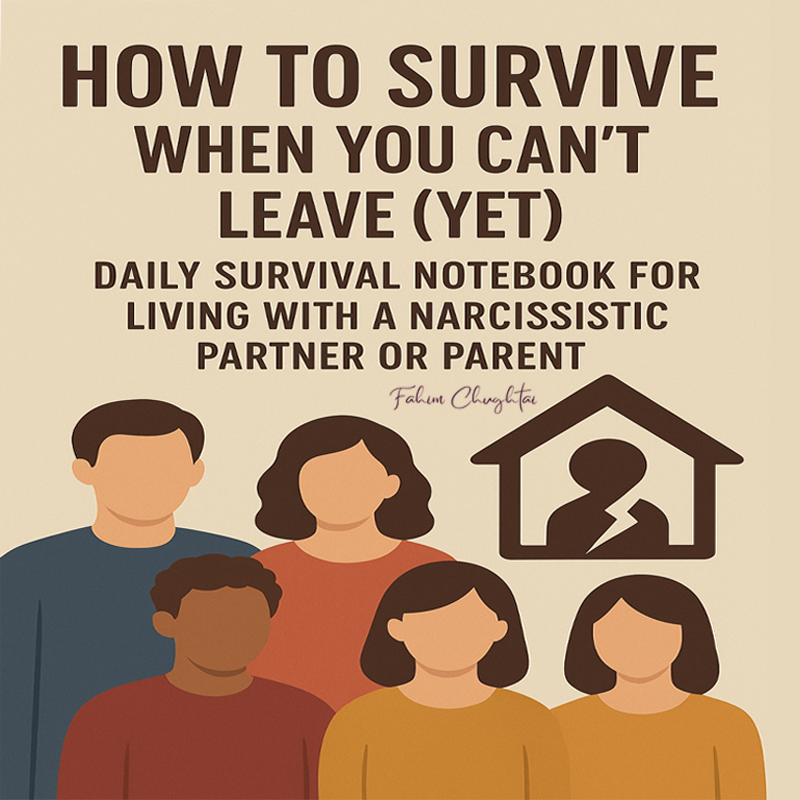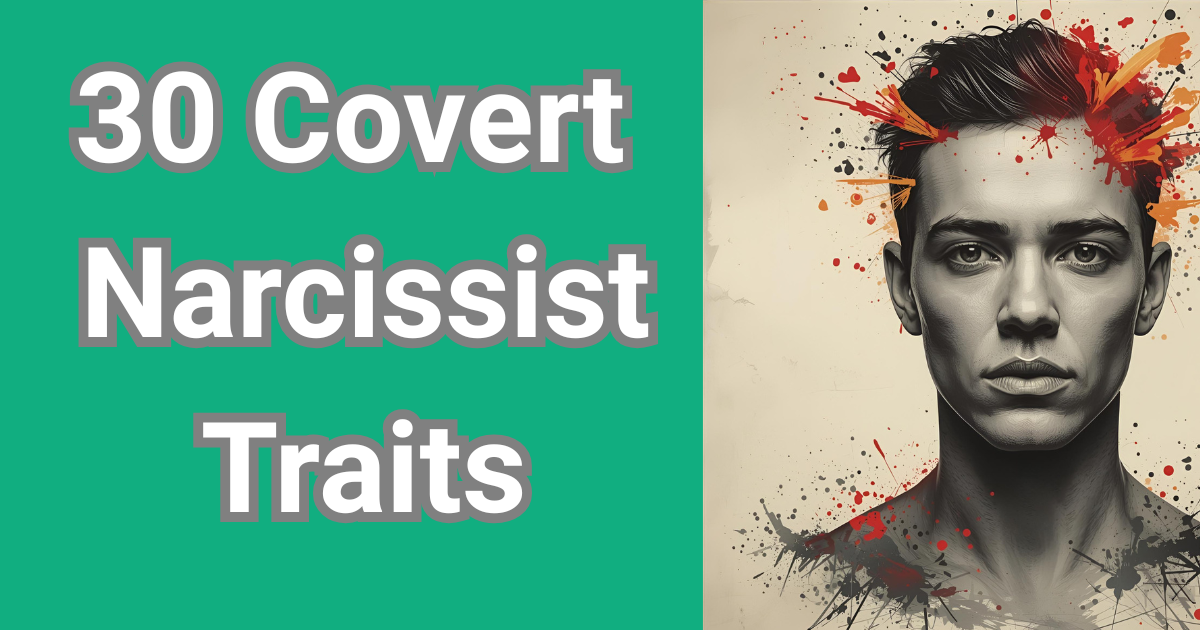Understanding covert narcissist traits could be the key to protecting yourself from one of the most insidious forms of psychological manipulation. Unlike their grandiose counterparts who demand attention openly, covert narcissists operate in shadows, making their destructive patterns harder to detect until significant damage is done.
- What Makes Covert Narcissist Traits So Dangerous?
- The Hidden Psychology Behind Covert Narcissism
- 30 Covert Narcissist Traits That Expose Their True Identity
- How Covert Narcissist Traits Develop: The Hidden Origins
- The Devastating Impact of Covert Narcissist Traits on Relationships
- Recognizing Covert Narcissist Traits: Red Flags and Warning Signs
- The Difference Between Covert and Overt Narcissist Traits
- How to Respond to Covert Narcissist Traits
- Breaking Free from Covert Narcissistic Relationships
- The Long-Term Impact of Covert Narcissist Traits on Victims
- Professional Treatment for Covert Narcissism
- Protecting Yourself: Prevention and Early Intervention
- The Difference Between Covert Narcissism and Other Conditions
- Understanding the Vulnerable Narcissist Spectrum
- Conclusion: Protecting Yourself from Hidden Manipulation
After seven years of working with survivors of narcissistic abuse, I’ve witnessed countless individuals struggle to identify these subtle yet devastating behavioral patterns. The confusion is understandable—covert narcissists appear humble, sensitive, even vulnerable on the surface. Yet beneath this carefully crafted facade lies a web of manipulation, exploitation, and emotional abuse that can destroy your sense of reality.
This comprehensive guide reveals 30 specific covert narcissist traits that expose their true nature, helping you recognize these patterns before they ensnare you deeper into their toxic web.
What Makes Covert Narcissist Traits So Dangerous?
Covert narcissist traits differ fundamentally from overt narcissistic behaviors. While grandiose narcissists announce their superiority loudly, covert narcissists achieve the same goals through subtle manipulation, passive-aggression, and playing the victim. This makes them exponentially more dangerous because their tactics fly under the radar of most people’s awareness.
Am I Dealing With a Covert Narcissist — or Just Toxic Behavior?
Research in personality psychology reveals that covert narcissists, also known as vulnerable narcissists, introverted narcissists, or closet narcissists, share the same core deficits as their overt counterparts: lack of empathy, grandiose self-perception, and exploitation of others. However, these traits manifest through entirely different behavioral patterns that can take years to recognize.
These hypersensitive narcissists operate through what researchers term “vulnerable narcissism”—a subtype characterized by emotional fragility, defensive behaviors, and hypervigilant responses to perceived criticism. Unlike their exhibitionistic counterparts, thin-skinned narcissists hide their grandiosity behind facades of humility and victimization.
The neurological basis remains the same—impaired empathy centers in the brain, difficulty with emotional regulation, and an underdeveloped sense of authentic self. But covert narcissists have learned to mask these deficits behind a veneer of sensitivity and humility, making them master manipulators who can infiltrate your life undetected.
The Hidden Psychology Behind Covert Narcissism
Before diving into specific traits, it’s crucial to understand the psychological foundation that drives covert narcissistic behavior. Unlike overt narcissists who received excessive praise or criticism in childhood, covert narcissists often developed their patterns as survival mechanisms in emotionally neglectful or unpredictable environments.
They learned that direct attention-seeking resulted in punishment or abandonment, so they adapted by seeking narcissistic supply through indirect means—playing victim, passive-aggression, and emotional manipulation. This creates individuals who are simultaneously grandiose and fragile, superior yet perpetually wounded.
This psychological profile creates the perfect storm for the 30 traits we’ll explore, each designed to secure attention, control, and validation while maintaining plausible deniability about their manipulative intentions.
30 Covert Narcissist Traits That Expose Their True Identity
1. Chronic Victim Mentality
Covert narcissists consistently position themselves as misunderstood, overlooked, or wronged by others. They collect grievances like trophies, constantly sharing stories of how people have mistreated them. This victim narrative serves multiple purposes: it deflects accountability, generates sympathy, and positions them as special sufferers who deserve extra consideration and care.
2. Passive-Aggressive Communication
Rather than expressing anger directly, covert narcissists use subtle hostility through silent treatments, sarcastic comments, “forgetting” important commitments, or giving backhanded compliments. This allows them to hurt you while maintaining innocence—”I was just joking” or “You’re being too sensitive.”
3. Emotional Manipulation Through Self-Pity
They weaponize their own pain to control others, making statements like “I guess I’m just worthless” or “Nobody understands me.” These manipulative displays force you to comfort them instead of addressing their harmful behavior, effectively hijacking conversations and relationships.
4. Grandiose Fantasies Hidden Behind Humility
While appearing modest, covert narcissists harbor elaborate fantasies of recognition, success, or vindication. They may speak about “when people finally realize my worth” or hint at their unrecognized talents and contributions, expecting others to validate their hidden specialness.
5. Hypersensitivity to Criticism
Even gentle feedback triggers defensive reactions, sulking, or emotional shutdown. They interpret constructive criticism as personal attacks and respond with hurt feelings rather than consideration of the feedback. This hypervigilant response pattern protects their fragile ego while making normal communication impossible. Thin-skinned narcissists often describe themselves as “highly sensitive people” to justify their extreme reactions.
6. Subtle Superiority Complex
They express their sense of superiority through intellectual snobbery, moral righteousness, or claims of higher sensitivity than others. Comments like “Most people don’t understand” or “I’m more intuitive than others” reveal their belief in their inherent specialness. This grandiose sense of self remains hidden beneath false humility and self-deprecating behaviors.
7. Exploitation Disguised as Helplessness
Vulnerable narcissists often appear needy or incompetent to get others to handle their responsibilities. They may claim they “don’t know how” to do basic tasks or feel “overwhelmed” by normal adult obligations, manipulating others into caretaking roles. This learned helplessness masks their sense of entitlement to others’ service.
8. Conditional Empathy
Their empathy appears and disappears based on their needs. They show deep concern when it serves them but become remarkably cold when others need support. This conditional compassion reveals their inability to genuinely care about others’ wellbeing.
9. Triangulation Through Third Parties
They create drama and competition by discussing relationship conflicts with others, sharing private information, or comparing people unfavorably. This triangulation serves to maintain control and keep people competing for their attention and approval.
10. Guilt and Shame Weaponization
Master manipulators of guilt, they make others feel responsible for their emotional states. Phrases like “After everything I’ve done for you” or “I thought you cared about me” manipulate others into compliance through manufactured shame.
11. Attention-Seeking Through Crisis
They create or exaggerate problems to become the center of attention. Medical issues, family dramas, or work crises often coincide with times when attention is focused elsewhere, redirecting concern back to them.
12. Dismissive of Others’ Achievements
When others succeed, covert narcissists minimize accomplishments through subtle comments like “Anyone could have done that” or by immediately shifting focus to their own struggles or achievements. They cannot genuinely celebrate others’ happiness.
13. Boundary Violations Under the Guise of Caring
They pry into personal matters, offer unsolicited advice, or ignore explicitly stated boundaries while claiming to be “helpful” or “concerned.” This intrusive behavior serves their need for control while appearing well-intentioned.
14. Projection of Their Own Flaws
They accuse others of traits they themselves possess—calling others selfish, manipulative, or attention-seeking. This psychological projection deflects attention from their own behavior while making targets question their own actions.
15. Performative Vulnerability
Their emotional displays often feel calculated rather than genuine. They share personal struggles or trauma in ways that seem designed to elicit specific responses rather than genuine connection, using vulnerability as a manipulation tool. Closet narcissists excel at weaponizing their emotional sensitivity to gain sympathy and control.
16. Selective Memory and Gaslighting
They “forget” conversations, promises, or events that don’t serve their narrative while having perfect recall for perceived slights against them. This selective memory gaslights others into questioning their own recollections and reality. Introverted narcissists use this subtle form of psychological manipulation to maintain control.
17. Covert Competition and One-Upmanship
Every conversation becomes an opportunity to subtly assert superiority. If you mention a problem, they’ve had it worse. If you share good news, they deflect with their own achievements or minimize your success through comparison. This passive-aggressive competitive behavior reveals their underlying grandiose fantasies.
18. Emotional Unavailability Disguised as Depth
They claim to be “too sensitive” or “too deep” for normal emotional expression, using this as an excuse for emotional withholding. This pseudo-profundity masks their inability to form genuine emotional connections.
19. Backhanded Compliments and Veiled Insults
Their praise comes with subtle cuts: “You look great for your age” or “That’s surprisingly good for you.” These veiled insults undermine confidence while maintaining plausible deniability about their hostile intentions.
20. Martyrdom and Self-Sacrifice Performance
They loudly proclaim their sacrifices and good deeds, expecting recognition and gratitude. This performative altruism serves their need for narcissistic supply while positioning them as morally superior to others.
21. Inconsistent Personality Presentation
Their personality shifts dramatically based on their audience and needs. They become whoever they need to be to secure supply, making it difficult for others to know their authentic self—because there isn’t one.
22. Chronic Dissatisfaction and Complaining
Nothing is ever quite right in their world. They constantly complain about circumstances, people, or situations while refusing to take action to improve their conditions. This chronic negativity drains others while securing attention and sympathy.
23. Exploitation of Others’ Empathy
They instinctively identify empathetic individuals and exploit their compassion. Kind-hearted people become targets for their manipulation because they’re more likely to excuse harmful behavior and provide endless emotional support.
24. Secret Entitlement and Double Standards
While appearing humble, they expect special treatment, exceptions to rules, or preferential consideration. They apply different standards to themselves versus others, believing they deserve accommodation that others don’t merit.
25. Emotional Vampirism
Interactions with them leave others feeling drained, confused, or emotionally depleted. They consume others’ emotional energy through constant need for validation, crisis management, or walking on eggshells around their sensitivities. This emotional manipulation is a hallmark of vulnerable narcissistic personality disorder.
26. Subtle Sabotage of Others’ Success
They undermine others’ achievements through “innocent” mistakes, forgotten commitments, or planting seeds of doubt. This sabotage maintains their sense of superiority while appearing accidental or well-intentioned. Hypervigilant narcissists carefully monitor others’ success to find opportunities for subtle undermining.
27. Intellectualization of Emotions
They discuss feelings in analytical, detached ways rather than actually experiencing them. This intellectualization serves as emotional armor, protecting their fragile ego while appearing psychologically sophisticated. Closet narcissistic personality disorder often manifests through this pseudo-intellectual emotional detachment.
28. Covert Rage and Resentment
Their anger expresses through sulking, withdrawal, passive-aggressive behavior, or explosive outbursts followed by victim narratives. This covert rage punishes others while allowing them to deny their hostility.
29. Pseudo-Intimacy and False Closeness
They rush emotional intimacy, sharing deep personal information early in relationships to create artificial bonds. This false intimacy serves to secure narcissistic supply quickly while creating obligations in others to reciprocate care.
30. Resistance to Genuine Self-Reflection
Despite claiming to be introspective or spiritual, they resist any genuine self-examination that might threaten their self-image. They prefer pseudo-therapeutic language and surface-level insights that maintain their grandiose self-perception.
How Covert Narcissist Traits Develop: The Hidden Origins
Understanding the development of covert narcissist traits provides crucial insight into why these patterns are so persistent and difficult to change. Unlike overt narcissists who often experienced either excessive praise or criticism, vulnerable narcissists typically developed their patterns in response to emotional neglect, inconsistent caregiving, or environments where direct attention-seeking was punished.
Childhood Foundations
Research indicates that closet narcissism often emerges from attachment disruptions where children learned that their emotional needs were burdensome or unwelcome. These children adapted by developing indirect strategies for securing attention and care—strategies that persist into adulthood as the manipulative patterns we observe.
The introverted narcissist learned to be “special” through suffering, sensitivity, or hidden talents rather than through direct achievement or acknowledgment. This creates adults who simultaneously feel superior and victimized, special yet unrecognized—the hallmark of vulnerable narcissistic personality disorder.
Neurological Underpinnings
Brain imaging studies reveal that individuals with narcissistic traits show reduced activity in areas associated with empathy and emotional regulation. For hypersensitive narcissists, this manifests as an inability to genuinely connect with others’ emotional experiences while maintaining an acute awareness of how to manipulate those emotions for their benefit.
The Devastating Impact of Covert Narcissist Traits on Relationships
Covert narcissist traits create uniquely damaging relationship dynamics because their subtle nature makes victims question their own perceptions and reactions. Unlike overt abuse, which is clearly identifiable, covert narcissistic abuse operates through accumulated micro-aggressions, gaslighting, and emotional manipulation that erodes victims’ confidence and reality testing over time.
Romantic Relationships
In intimate partnerships, covert narcissists create emotionally one-sided relationships where their needs consistently take priority. They use emotional manipulation, guilt, and their victim status to avoid accountability while demanding constant emotional support and validation from their partners.
Partners often describe feeling like they’re “walking on eggshells,” never knowing what might trigger their emotional withdrawal, passive-aggressive punishment, or victim narratives. The relationship becomes centered around managing the covert narcissist’s emotions while their own needs remain unmet and unacknowledged.
Family Dynamics
Within families, covert narcissists often position themselves as the “identified patient”—the sensitive one who needs special consideration. They may create coalition dynamics, triangulating family members against each other while positioning themselves as misunderstood victims of family dysfunction.
Children of covert narcissists often struggle with guilt, confusion, and difficulty trusting their own emotional responses because their parent’s needs consistently overshadowed their own developmental needs.
Workplace Impact
Professional environments provide perfect hunting grounds for covert narcissists because their subtle manipulation tactics can appear like collaboration or sensitivity. They excel at appearing helpful while undermining colleagues, playing victim to avoid accountability, and manipulating workplace dynamics for personal advantage.
Recognizing Covert Narcissist Traits: Red Flags and Warning Signs
Early recognition of covert narcissist traits is crucial for protecting your emotional well-being and avoiding deeper entanglement in their manipulative dynamics. Here are key warning signs that indicate you may be dealing with a covert narcissist:
Early Relationship Red Flags
- Love-bombing followed by devaluation: Initial excessive attention and praise followed by subtle criticism and withdrawal
- Rushed intimacy: Sharing deep personal information early to create artificial bonds
- Victim stories: Extensive narratives about how others have wronged them
- Passive-aggressive communication: Indirect hostility when their expectations aren’t met
- Hypersensitivity: Extreme reactions to normal feedback or boundaries
Ongoing Relationship Patterns
- Emotional vampirism: Consistently leaving interactions feeling drained or confused
- Reality distortion: Making you question your memories, perceptions, or emotional reactions
- One-sided emotional support: Always providing comfort while receiving none in return
- Guilt manipulation: Using shame and guilt to control your behavior and choices
- Triangulation: Creating drama by involving third parties in relationship conflicts
Professional Red Flags
- Undermining colleagues: Subtle sabotage disguised as helpfulness or concern
- Victim narratives: Constantly complaining about unfair treatment by supervisors or coworkers
- Credit appropriation: Taking credit for others’ work while downplaying their own mistakes
- Boundary violations: Prying into personal matters under the guise of caring or friendship
The Difference Between Covert and Overt Narcissist Traits
Understanding the distinction between covert and overt narcissistic presentations is crucial for accurate identification and appropriate response strategies.
Overt Narcissist Characteristics
- Grandiose self-presentation and boasting
- Direct demands for attention and admiration
- Obvious sense of entitlement and superiority
- Aggressive responses to criticism
- Extroverted, attention-seeking behavior
Covert Narcissist Characteristics
- Hidden grandiosity masked by false humility
- Indirect attention-seeking through victim narratives
- Passive-aggressive expression of entitlement
- Withdrawn, sulking responses to criticism
- Introverted, seemingly sensitive presentation
Both types share the same underlying deficits—lack of empathy, exploitation of others, and grandiose self-perception—but express these traits through opposite behavioral strategies. Vulnerable narcissism represents the introverted end of the narcissistic spectrum, while exhibitionistic narcissism represents the extroverted end.
How to Respond to Covert Narcissist Traits
Dealing with someone who displays covert narcissist traits requires specific strategies that account for their subtle manipulation tactics and victim positioning.
Boundary Setting Strategies
Clear, Consistent Communication: Use direct, specific language about acceptable behavior. Avoid emotional appeals or explanations that they can use against you.
Gray Rock Method: Become uninteresting by providing minimal emotional responses to their manipulation attempts. This reduces their narcissistic supply and motivation to continue targeting you.
Document Interactions: Keep records of conversations and incidents to maintain clarity about reality when they attempt gaslighting or memory manipulation.
Emotional Protection Techniques
Validate Your Own Perceptions: Trust your emotional responses and experiences rather than their alternative narratives about what happened.
Limit Personal Information Sharing: Reduce the ammunition they have for future manipulation by keeping personal details private.
Maintain Outside Support Systems: Regular contact with trusted friends and family provides reality checks and emotional support outside the toxic dynamic.
Professional Boundaries
Focus on Work-Related Communication: Keep interactions limited to necessary professional topics to minimize manipulation opportunities.
Document Everything: Maintain detailed records of work interactions, especially instances of undermining or credit appropriation.
Involve Management When Necessary: Don’t hesitate to escalate patterns of workplace manipulation or sabotage to appropriate supervisors.
Breaking Free from Covert Narcissistic Relationships
Recovery from relationships with individuals displaying covert narcissist traits requires understanding that the confusion and self-doubt you experience are natural responses to their manipulation tactics.
Healing Strategies
Trauma-Informed Therapy: Work with mental health professionals who understand narcissistic abuse and its specific impacts on victims’ reality testing and self-trust.
Support Groups: Connect with others who have experienced similar relationships to validate your experiences and learn recovery strategies.
Self-Compassion Practice: Develop kindness toward yourself as you recognize that falling for these manipulation tactics reflects your empathy, not your weakness.
Rebuilding Self-Trust
Journal Your Experiences: Writing about interactions helps clarify reality and identify manipulation patterns you might otherwise dismiss or forget.
Practice Assertiveness: Gradually rebuild your ability to express needs, set boundaries, and trust your emotional responses.
Reconnect with Your Values: Covert narcissists often manipulate victims into betraying their own values. Reconnecting with what truly matters to you aids recovery.
The Long-Term Impact of Covert Narcissist Traits on Victims
Understanding the lasting effects of exposure to covert narcissist traits helps explain why recovery takes time and why professional support is often necessary.
Psychological Effects
Complex PTSD: Extended exposure to covert narcissistic manipulation can create symptoms similar to post-traumatic stress disorder, including hypervigilance, emotional dysregulation, and difficulty trusting others.
Cognitive Dissonance: The contradiction between the narcissist’s caring facade and harmful behavior creates internal conflict that can persist long after the relationship ends.
Eroded Self-Trust: Constant gaslighting and reality distortion makes victims question their own perceptions, leading to difficulty making decisions and trusting their judgment.
Relationship Patterns
Difficulty Setting Boundaries: Victims often struggle to identify and maintain healthy boundaries after being conditioned to prioritize the narcissist’s needs.
Attraction to Similar Patterns: Without proper healing, survivors may unconsciously gravitate toward similar relationship dynamics, mistaking manipulation for depth or sensitivity.
Hypervigilance in Relationships: The subtle nature of covert narcissistic abuse can make survivors overly cautious in new relationships, sometimes interpreting normal behavior as potential manipulation.
Professional Treatment for Covert Narcissism
While individuals displaying covert narcissist traits rarely seek treatment voluntarily, understanding treatment possibilities helps family members and partners make informed decisions about their own involvement.
Treatment Challenges
Lack of Self-Awareness: Covert narcissists typically view themselves as victims rather than perpetrators, making genuine engagement in therapy difficult.
Manipulation of Therapeutic Process: They may use therapy as another venue for validation-seeking rather than genuine self-examination and change.
Resistance to Vulnerability: True therapeutic progress requires genuine vulnerability, which threatens their carefully constructed self-image.
Treatment Approaches
Dialectical Behavior Therapy (DBT): Helps develop emotional regulation skills and distress tolerance, addressing some underlying deficits.
Still Living With Them? You’re Not Helpless.

Schema Therapy: Addresses deep-rooted patterns and beliefs that maintain narcissistic behaviors.
Mentalization-Based Therapy: Focuses on developing the ability to understand others’ mental states, addressing empathy deficits.
Protecting Yourself: Prevention and Early Intervention
The best defense against covert narcissist traits is developing the awareness and skills to recognize these patterns early, before significant emotional damage occurs.
Educational Awareness
Study Manipulation Tactics: Understanding how emotional manipulation works helps you recognize it when it’s directed at you.
Trust Your Instincts: If something feels “off” about someone’s behavior, investigate those feelings rather than dismissing them.
Learn Healthy Relationship Patterns: Understanding what genuine empathy, respect, and reciprocity look like helps you identify their absence.
Personal Development
Strengthen Your Sense of Self: People with strong self-awareness and confidence are less vulnerable to manipulation tactics.
Develop Emotional Intelligence: Understanding your own emotional patterns and triggers helps you recognize when someone is attempting to manipulate them.
Build Strong Support Networks: Healthy relationships with emotionally available people provide contrast to narcissistic dynamics and support your reality testing.
The Difference Between Covert Narcissism and Other Conditions
Covert narcissist traits can sometimes be confused with other mental health conditions, making accurate identification crucial for appropriate responses.
You’ve Seen the Patterns. Now Break the Bond.
Depression vs. Covert Narcissism
While both conditions may involve withdrawal and negative affect, vulnerable narcissists use their emotional states to manipulate others, whereas individuals with depression typically don’t exploit others’ empathy for personal gain. Closet narcissists may present depressive symptoms but lack genuine empathy and maintain grandiose fantasies.
Social Anxiety vs. Covert Narcissism
Social anxiety involves genuine fear of judgment and rejection, while introverted narcissists fear exposure of their grandiose false self. The underlying motivations and relationship patterns differ significantly—anxiety sufferers want connection, while hypersensitive narcissists want control and validation.
Borderline Personality Disorder vs. Covert Narcissism
Both conditions involve emotional instability and relationship difficulties, but borderline personality disorder typically includes genuine fear of abandonment and capacity for empathy, while vulnerable narcissistic personality disorder centers on exploitation and grandiosity disguised as vulnerability.
Understanding the Vulnerable Narcissist Spectrum
Covert narcissist traits exist on a continuum of vulnerable narcissism that includes several related subtypes identified by researchers. Understanding these variations helps recognize the full scope of covert narcissistic presentations.
Closet Narcissistic Personality Disorder
Psychoanalyst James Masterson identified closet narcissistic personality disorder as a distinct subtype characterized by deflated self-perception and inadequate self-esteem. These individuals appear modest and self-deprecating while harboring grandiose fantasies and expectations of special treatment.
Hypervigilant Narcissism
Hypervigilant narcissists constantly scan their environment for signs of criticism or rejection. This hypersensitive monitoring creates chronic anxiety and defensive reactions to perceived slights that others might not even notice.
Thin-Skinned Narcissism
Thin-skinned narcissists react with extreme sensitivity to any form of criticism or perceived disrespect. Their emotional reactions are disproportionate to the trigger, often involving withdrawal, sulking, or passive-aggressive retaliation.
Fragile Narcissism
The fragile narcissist presents with apparent vulnerability and self-doubt while maintaining an underlying sense of superiority. This fragility serves as both protection and manipulation tool, eliciting care from others while avoiding accountability.
These subtypes overlap significantly and many introverted narcissists display characteristics from multiple categories. The common thread is their shared need for narcissistic supply obtained through indirect, manipulative means rather than direct attention-seeking behaviors.
The most overlooked covert narcissist traits include their victim mentality, passive-aggressive communication, and emotional manipulation through self-pity. Unlike overt narcissists who are obviously grandiose, covert narcissists appear humble and sensitive, making their manipulation tactics harder to recognize. They excel at making others feel guilty for their emotional states while positioning themselves as misunderstood victims who need special care and consideration.
Genuinely sensitive people show consistent empathy, take responsibility for their actions, and don’t manipulate others’ emotions for personal gain. Covert narcissist traits include using sensitivity as a weapon—they become “hurt” when challenged, use their emotions to control others, and show conditional empathy that appears only when it serves their needs. Their sensitivity is performative and self-serving rather than genuine.
Yes, narcissistic traits exist on a spectrum. Someone can display covert narcissist traits without meeting the full diagnostic criteria for Narcissistic Personality Disorder. However, these traits still create harmful relationship dynamics through manipulation, emotional exploitation, and lack of genuine empathy. The impact on relationships can be significant regardless of whether it reaches clinical diagnosis levels.
Workplace covert narcissist traits include subtle sabotage of colleagues, taking credit for others’ work while downplaying their own mistakes, creating victim narratives about unfair treatment, and using emotional manipulation to avoid accountability. They often appear helpful while undermining others, position themselves as misunderstood or overworked, and create triangulation dynamics among team members.
Covert narcissist traits can appear in any gender, though research suggests they may be slightly more common in women due to socialization patterns that discourage direct aggression and encourage indirect manipulation. However, the specific manifestation of traits can vary by gender—male covert narcissists might use intellectual superiority, while female covert narcissists might employ emotional manipulation more frequently.
Conclusion: Protecting Yourself from Hidden Manipulation
Understanding these 30 covert narcissist traits empowers you to recognize manipulation before it destroys your emotional well-being and sense of reality. Unlike overt narcissists whose harmful behaviors are obvious, vulnerable narcissists operate through subtle psychological warfare that can take years to identify and understand.
The key to protection lies in trusting your emotional responses, maintaining strong support systems, and remembering that genuine love and respect never require you to sacrifice your sense of reality or self-worth. If interactions with someone consistently leave you feeling confused, guilty, or emotionally drained despite their apparent sensitivity or victimization, you may be dealing with a closet narcissist or introverted narcissist.
Vulnerable narcissistic personality disorder represents one of the most challenging forms of psychological manipulation because it masquerades as sensitivity and depth. These hypersensitive narcissists excel at exploiting empathy while providing none in return.
Recovery is possible, but it requires recognizing that the confusion and self-doubt you experience are not personal failings—they’re natural responses to sophisticated manipulation tactics designed to exploit your empathy and compassion.
Your healing journey begins with education, continues with boundary-setting, and flourishes when you reconnect with your own worth, wisdom, and capacity for genuine, reciprocal relationships. You deserve connections built on mutual respect, authentic empathy, and honest communication—never settle for manipulation disguised as sensitivity.
Remember: recognizing these traits isn’t about diagnosing others, but about protecting yourself from psychological harm and building the awareness necessary for healthy, fulfilling relationships.






